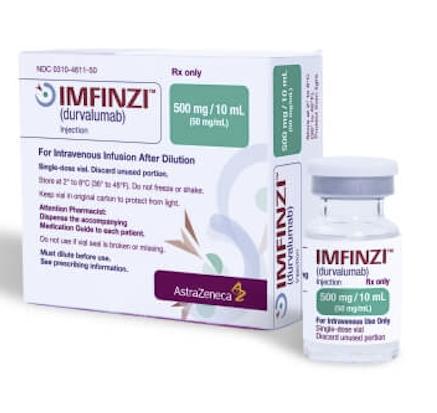IMFINZI Breakthrough Transforms Gastric Cancer Treatment Landscape With 29% Reduction in Recurrence Risk
New immunotherapy regimen poised to become standard of care after landmark trial results show substantial survival benefits for early-stage patients
AstraZeneca's IMFINZI® has demonstrated a dramatic 29% reduction in the risk of disease progression, recurrence, or death when combined with standard chemotherapy in early-stage gastric and gastroesophageal junction cancers. The groundbreaking results from the global MATTERHORN Phase III trial were presented yesterday at the 2025 American Society of Clinical Oncology Annual Meeting and simultaneously published in The New England Journal of Medicine.
The findings represent the first time an immunotherapy has shown a statistically significant survival benefit in this setting, potentially establishing a new treatment paradigm for a disease that has seen limited therapeutic advances in recent decades.

Beyond the Numbers: A Widening Survival Gap
The trial's interim analysis revealed that patients receiving the IMFINZI-based perioperative regimen showed substantially improved outcomes compared to those receiving chemotherapy alone. While the median event-free survival has not yet been reached in the IMFINZI arm, it was 32.8 months for patients receiving only chemotherapy.
What's particularly striking is how the survival gap widens over time. At the one-year mark, 78.2% of IMFINZI-treated patients remained event-free compared to 74.0% in the control arm. By the two-year mark, this gap had expanded significantly – 67.4% versus 58.5% – suggesting the immunotherapy's effect strengthens rather than diminishes over time.
"These results represent a genuine breakthrough," said an oncologist specializing in gastrointestinal cancers who was not involved in the study. "The widening survival curves at two years suggest durvalumab is providing a durable immune response that continues to protect patients from recurrence long after treatment ends."
A Critical Need Addressed
Despite curative-intent surgery and chemotherapy, gastric cancer patients face grim statistics. Approximately one in four develop recurrent disease within a year of surgery, and another quarter don't survive beyond two years. Five-year survival rates remain below 50% globally.
The MATTERHORN trial specifically targeted this high-risk window. Patients received IMFINZI alongside FLOT chemotherapy (fluorouracil, leucovorin, oxaliplatin, and docetaxel) before and after surgery, followed by IMFINZI monotherapy.
Perhaps most remarkably, the pathological complete response rate more than doubled in the IMFINZI arm (19% versus 7%), meaning nearly one-fifth of patients showed no evidence of cancer cells in their surgical specimens after pre-surgical treatment.
Surgical Concerns Alleviated
A critical question surrounding immunotherapy in the perioperative setting has been whether it might complicate surgical outcomes. The MATTERHORN results decisively addressed these concerns, with surgical completion rates identical between the IMFINZI and control arms.
"The equal surgical completion rates are particularly reassuring," noted a surgical oncologist who reviewed the findings. "There had been theoretical concerns that immunotherapy might cause inflammation that would complicate resections, but these data show no such effect."
The safety profile remained consistent with previous studies, with similar rates of Grade 3 or higher adverse events between the two treatment arms. This suggests adding IMFINZI doesn't significantly increase the toxicity burden for patients already receiving intensive chemotherapy.
First-Mover Advantage in Competitive Landscape
IMFINZI's positive data puts AstraZeneca in a leading position among competitors in the gastric cancer space. While Merck's pembrolizumab has shown promising pathological complete response rates in the KEYNOTE-585 trial, it has not yet demonstrated a significant event-free survival advantage.
Similarly, Bristol Myers Squibb's nivolumab lacks mature Phase III data in the perioperative gastric cancer setting, though it has shown benefits in metastatic disease and adjuvant esophageal cancer.
"AstraZeneca has effectively leapfrogged the competition with these results," commented a pharmaceutical analyst. "Being first with statistically significant EFS data gives them a substantial advantage in what's becoming an increasingly competitive immunotherapy landscape."
Market Implications and Investment Perspective
The commercial implications of these results are substantial. Approximately 43,000 patients with resectable early-stage gastric or gastroesophageal junction cancer receive drug treatment annually in the US, European Union, and Japan – a number projected to grow to 62,000 by 2030.
With strong data supporting IMFINZI's benefit regardless of PD-L1 expression, AstraZeneca could potentially capture a significant portion of this market.
"These results could translate to several billion dollars in additional annual revenue for AstraZeneca by 2028-2030," estimated a healthcare investment analyst. "The perioperative gastric cancer indication alone could contribute $3-4 billion annually at peak, potentially increasing IMFINZI's total revenue by 70-85%."
For investors considering the implications, analysts suggest AstraZeneca's risk/reward profile appears favorably weighted toward the upside, with the potential for multiple expansion if final overall survival data remain consistent with current trends.
"The robust event-free survival signal substantially enhances AstraZeneca's pipeline credibility and could support 15%+ oncology growth through 2028," noted a market strategist. "However, investors should monitor the definitive overall survival data expected in late 2025 or early 2026, as well as pricing negotiations and market access developments."
Regulatory Pathway and Global Impact
With the strong statistical significance of the primary endpoint , AstraZeneca is positioned to submit regulatory applications to the FDA, EMA, and other health authorities in the coming months. Approval could come as early as late 2025 or early 2026.
The MATTERHORN trial's global footprint – conducted across 176 centers in 20 countries – strengthens the case for widespread adoption in clinical guidelines. However, challenges remain, particularly around reimbursement given the high cost of immunotherapy regimens.
"Health technology assessment bodies will scrutinize the cost-effectiveness carefully," cautioned a health economics expert. "The pending overall survival data will be crucial for these evaluations, as will real-world evidence on quality of life and resource utilization."
For the nearly one million patients diagnosed with gastric cancer annually worldwide, these results offer new hope in a disease area that has seen limited progress. If approved, the IMFINZI-based regimen would represent the first major advance in early-stage gastric cancer treatment in nearly a decade.
Past performance is not indicative of future results. This article contains forward-looking analysis based on current market data and established economic indicators. Readers should consult financial advisors for personalized investment guidance.
